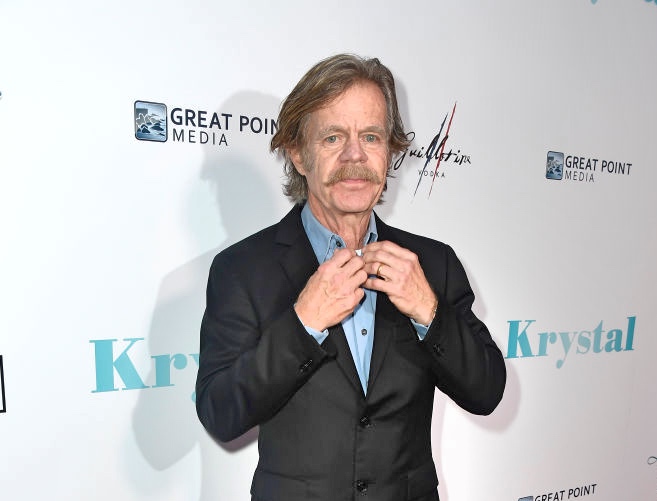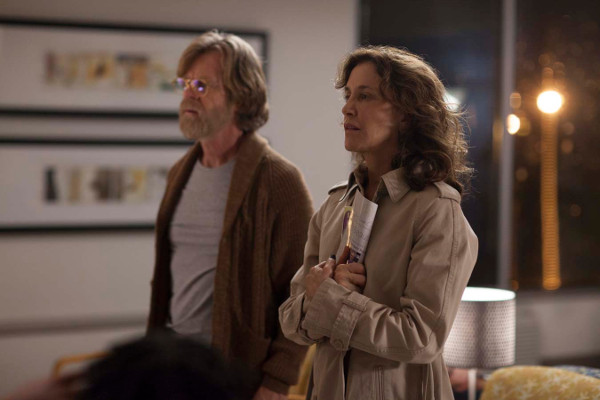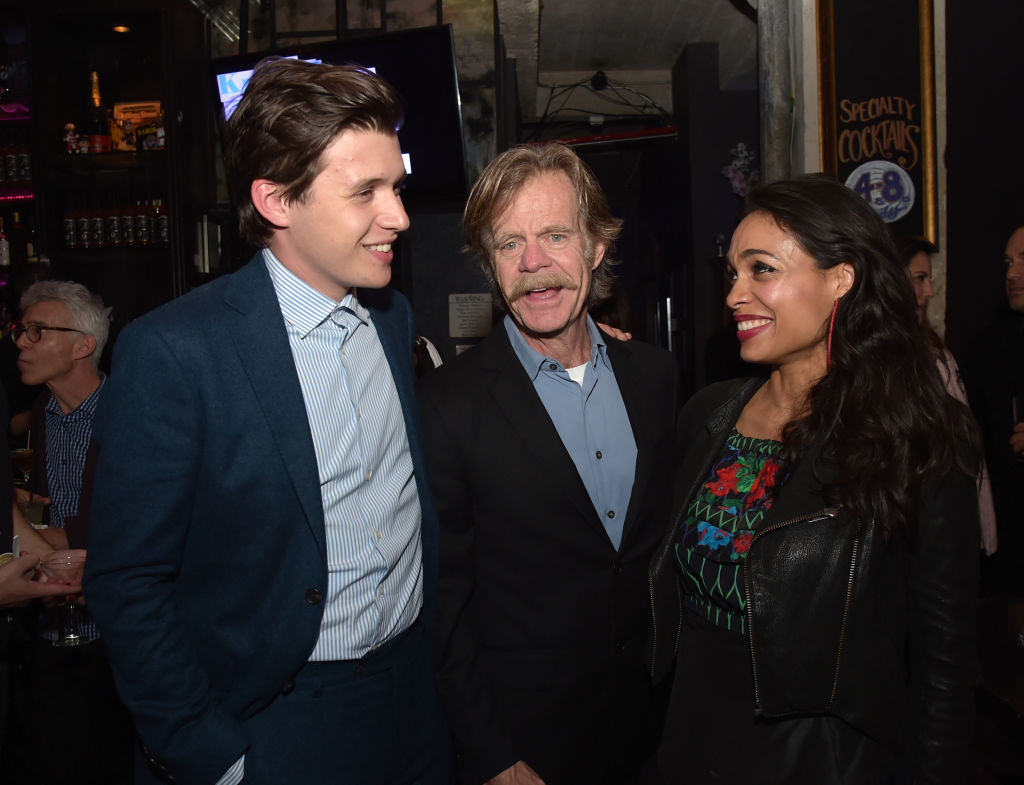
- Interviews
William H. Macy on “Krystal”: ‘I like being in charge’
At 68, William H. Macy is still enjoying the best time in his career. Shameless, the TV show for which he got two of his five Golden Globes nominations, will premiere its ninth season later this year. And on April 12th, Krystal, his third film as a director in which he also has a prominent role along with his wife, Golden Globe winner and six-time nominee Felicity Huffman, will be released in the United States. The film tells the story of an 18-year old, played by Nick Robinson, who falls in love for a much older woman (Rosario Dawson), a former stripper, hooker and ex-alcoholic who somehow has broken his heart, which, by the way, suffers from a very unusual condition. We had the chance to chat with Macy about the film, which also stars Kathy Bates, William Fichtner, and Grant Gustin.
This is not the first time you directed a film. What does directing give you that acting doesn’t?
Well, as the director, you get to tell the whole story, not just a small part of it. One of the wonderful things about being an actor, as opposed to a director, is that your responsibilities are very specific and somewhat limited, our purview is very small. We work in seconds really and most scenes are a minute or less. When you are a director, you are in charge of everything, you have to put it all together, you have to think way ahead and you have to think about what Stanislavsky said, what the super-objective is and what the writer has in mind and why are we telling this story? It’s a bigger canvas. I like being in charge and I like being the guy that gets to decide if it’s the red one or the green one, and that sort of thing.
And when you are acting in it, do you act because it’s needed to make this project happen, or you act in it because you like the character and you also want to participate as an actor?
I would say the second one. Also, it’s incumbent upon you as a director that if you are going to act in the film also if you take off that director’s hat, you have got to really take it off. And you have got to give the reins over to someone else. In my case, Rachel Winter, who produced the film, she is a lovely filmmaker herself, and she was behind the camera. Also, those were the only scenes that we had time to rehearse. So we knew what we were going to do. And that gave me more confidence to give up the control and get in front of the camera and let other people shoot it and trust that it’s going to work out alright. I don’t like being both an actor and a director, it’s too hard. But what made this one so much fun was that I got to act with Felicity and I loved those scenes. I loved the two characters and I just loved acting with her. And I think we are really good together. I think they are some of my favorite scenes in the film.

William H. Macy and Felicity Huffman in a scene from Krystal.
paladin/great point media
You are the director, and you are acting with your wife. How do you do things so there is not a fight afterward?
Felicity was also in my first film, called Rudderless, and I realized on that film that because of the familiarity of acting with your wife when you are directing, you have to guard that you don’t take advantage of your relationship. In other words, you have got to be kind and make sure that you give someone that you are close to, the same cordiality and the same amount of time as any other actor, because she had a tough role to act in both of these films and she deserved a good director. So it would be very easy to speak shorthand and in essence to say just do it, but be good, don’t pepper me with questions. But that is not right. So I just have to make sure that I am kind and gentle with her. But on the same token, we have talked about it, she’s very good where, because she is my wife, when she sees me stressed on set and drowning in some scene, I have her sympathy and she is kind with me and helpful, while other actors wouldn’t know what to do, or wouldn’t think that that’s their job. And I felt comforted having Felicity on set because I felt safer.
I heard that this project has been in the works for like 10 years.
Rachel has had it for almost 14 years. I was with it for about 12.
So why did it take so long?
I don’t know. I mean I read that script and I loved it and I thought it was great. We almost got it made two or three times. We would be in a month or two of beginning prep when the money would fall out. It’s an independent film, we tried to cobble it together in the regular ways. The film is a lot bigger and a lot more complicated than I thought when first fleshed. It’s got about eight or ten big roles, it’s a real ensemble piece. And for an independent film budget, that’s a lot of actors to take care of. Usually, an independent film will have two or three leads. You have got to fly them, first class, you have got to put them up, you have got to take care of them. That’s a lot of money. Also, the CGI for the Satan was more complicated than I had been told that it was going to be. And the tone of the piece, because it goes from farcical comedy to high drama in a heartbeat and it was hard to adjust the tone to tell the story in a way that the audience could follow it and not be whiplashed back and forth emotionally.
And what attracted you to it? What were the elements that made you stay with it for 12 years, besides the script?
Besides the script, nothing, it was the script. Well truthfully, Rachel Winter is the one that got this film made, she is more dogged than me, I gave up three or four times, but Rachel would not. She just doesn’t know the meaning of giving up. I loved his dialogue, Will Aldis’ dialogue is very theatrical. He has such affection for all the characters, and they all have a beginning, middle and end, they all have a payoff. I love the subject matter, on one hand, it’s about addictions, but deeper than that, it’s about fear, the nature of fear. I love the magical realism with Satan sort of representing it. I loved the humor of the thing, and I loved that it was such a big, walloping, loopy story. Every time I read it, I so enjoyed it, I could see it in my mind’s eye.

Nick Robinson, William H. Macy and Rosario Dawson at the premiere of Krystal.
kevin winter/getty images
Nick Robinson is the new thing coming out of Hollywood…
Well, I think Nick is going to have a big career. I wouldn’t be surprised if it’s a lot bigger than my career ever was, because he is so good looking, so talented, and he’s got a wonderful spirit. I had seen Nick do a very short turn in Boardwalk Empire and Rachel Winter is married to Terry Winter and so she had seen it. Nick was so good in that, I found out later that they expanded the role and they just loved him. And there he was acting with Steve Buscemi, who is a masterful actor, and you could tell that Steve recognized that Nick had something special going. I did ask Nick to read for me and he did, and I met with him two or three times and he didn’t read as much, we just got together and shot the breeze. And I got how smart he was. I saw Jurassic Park and having done of those films myself, I knew what the tough parts of that are and I thought he did it with grace and a lot of dignity. So it was easy to cast.
You work a lot in theater, but it took awhile for you to make it. Looking back, why do you think that was? Was it just luck?
Well, I didn’t do anything but theater. I started my career in Chicago, and I was there for eight years or something like that, and we started a theater company and that was a full-time job. There’s not much film work in Chicago. And I did get a couple of roles, I did a big miniseries out of Chicago and I did some TV, episodic work out of Chicago. But that wasn’t my major thrust. And Chicago was all about the St. Nicholas Theater and writing and producing and directing theater. And I moved to New York and I started doing more, but again, we started another company, The Atlantic Theater Company, David Mamet and I started that. Theater is what I was trained in and is what I loved the most and I kept doing it. But slowly but surely in New York, I got a couple of nice roles, and Dave Mamet put me in Homicide with Joe Mantegna and that did me a lot of good. And when I finally moved to Los Angeles, which was in 1990, I had a lot of experience and I knew a lot of people. And so I hit the ground running. And I got work almost immediately in film because there’s not much theater here, but I got a lot of film work, a lot of TV work, and I was working all the time. And I got better because I got to work a lot. And then I got Fargo and that changed everything.

